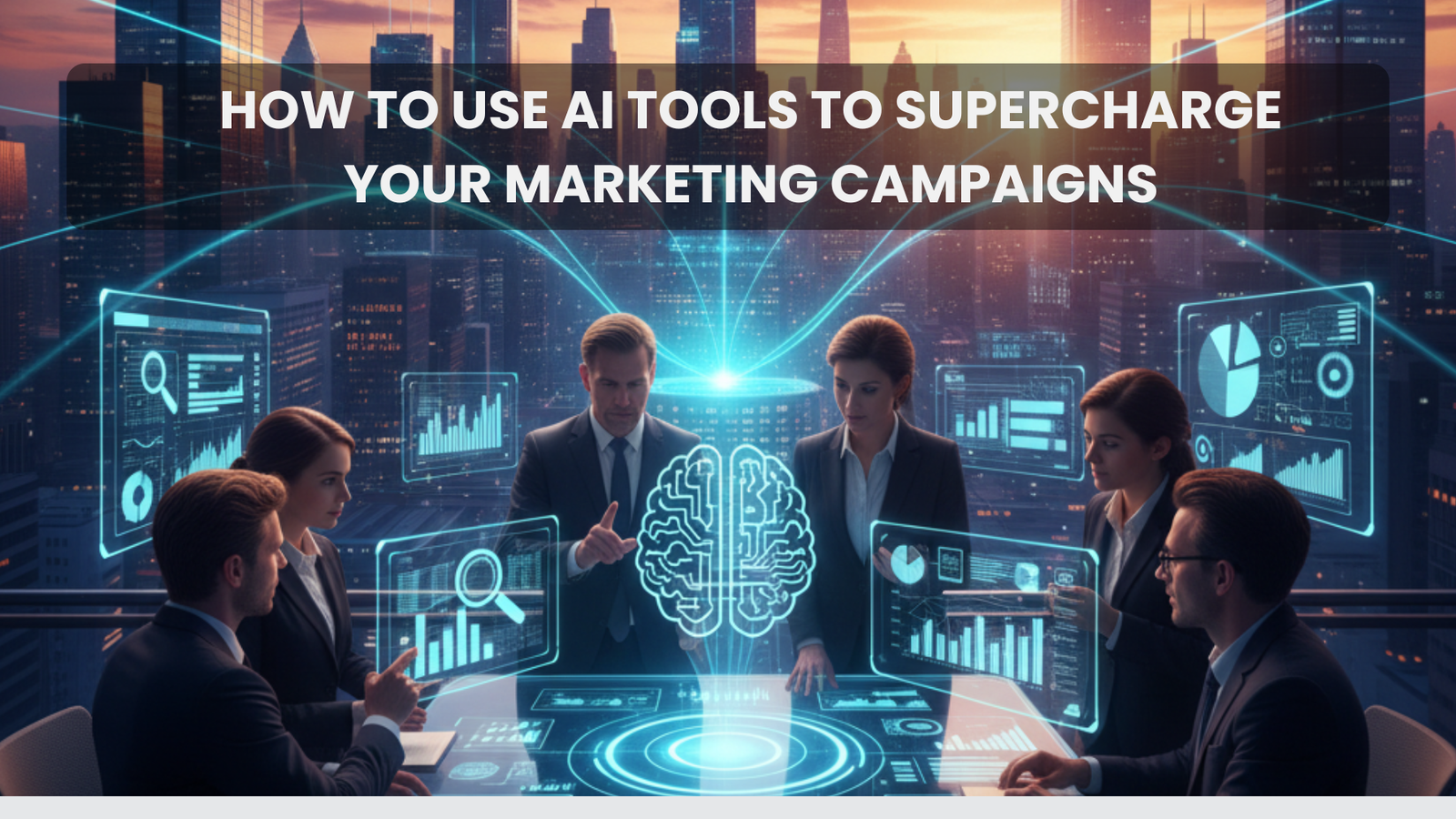Artificial Intelligence (AI) isn’t just for tech geeks or data scientists anymore — it’s transforming the way marketers plan, create, and execute campaigns. From writing social media captions to predicting customer behavior, AI tools are helping businesses of all sizes run smarter, faster, and more effective marketing campaigns.
If you’re looking to save time, improve performance, and get more out of your marketing efforts, AI is your new best friend. In this guide, we’ll walk through exactly how you can use AI tools to supercharge your marketing campaigns — even if you’re not a tech expert.
What Is AI Marketing and Why It Matters
AI marketing uses artificial intelligence to automate, analyze, and improve marketing tasks. Think of it as having a super-intelligent assistant who can process massive amounts of data, spot patterns you might miss, and help you make better decisions in real time.
Why It’s a Game-Changer
- Saves time: AI can handle repetitive tasks like scheduling posts or analyzing campaign data.
- Boosts accuracy: It uses real data and patterns — not just gut instinct — to make decisions.
- Personalizes experiences: AI helps you tailor messages for each customer.
- Improves ROI: By optimizing campaigns, AI ensures every dollar you spend goes further.
In short: AI helps you work smarter, not harder.
Automate Content Creation
Content is the backbone of any marketing campaign — but creating it can take hours (or days). Luckily, AI tools can now generate high-quality text, visuals, and even videos in minutes.
AI Copywriting Tools
Tools like ChatGPT, Jasper, and Copy.ai can write blog posts, ad copy, product descriptions, and emails based on a few prompts. You simply tell the tool what you need — your tone, topic, and audience — and it generates the content.
Pro Tip:
Use AI to create a first draft, then edit it with your brand’s voice and personality. This gives you both speed and authenticity.
Visual Content Creation
Not a graphic designer? No problem. AI design tools like Canva’s Magic Studio, Adobe Firefly, or DALL·E can generate stunning visuals, social media posts, and ad creatives. You just describe what you want, and AI brings it to life.
Example:
Type “a modern ad for organic coffee with a cozy vibe,” and the AI will generate an image ready for your Instagram feed.
Video Marketing with AI
Video is powerful — and AI makes it easier than ever. Tools like Synthesia or Pictory can turn text into videos with lifelike avatars and voiceovers. Others like Descript help edit videos automatically by simply editing the transcript.
Personalize Customer Experiences
Personalization is no longer optional — it’s expected. Today’s consumers want brands to understand their needs and deliver relevant content. AI makes this simple through data-driven insights and automation.
AI-Powered Recommendations
Ever noticed how Netflix or Amazon seems to know exactly what you want next? That’s AI-driven recommendation engines at work.
For marketers, tools like Dynamic Yield, Adobe Sensei, or HubSpot can help personalize website content, product recommendations, or emails based on each user’s behavior.
Smart Email Marketing
AI tools like Mailchimp, Klaviyo, and ActiveCampaign can segment your audience automatically and send the right message to the right person at the right time. They analyze open rates, click-throughs, and purchase history to personalize your campaigns.
Example:
If someone adds a product to their cart but doesn’t buy it, AI can trigger a perfectly timed reminder email — maybe even with a discount code.
Chatbots and Virtual Assistants
AI chatbots such as Drift, Intercom, or ManyChat can answer customer questions, capture leads, and even help close sales 24/7. They create a seamless experience for users — and free up your team’s time for more strategic work.
Optimize Advertising Performance
Running ads can be expensive — especially if they’re not hitting the right audience. AI can analyze your ad data in real time and automatically adjust targeting, bids, and creative elements to maximize ROI.
Smarter Ad Targeting
Platforms like Google Ads, Meta Ads, and LinkedIn Ads now include built-in AI that learns from user behavior to show your ads to the people most likely to convert.
Example:
Instead of manually guessing who to target, AI studies your current customers and finds similar profiles online.
Predictive Analytics
AI tools like Adzooma or Revealbot analyze your campaign data to predict which ads will perform best — even before you spend your budget. This helps you make informed decisions faster.
A/B Testing with AI
Traditional A/B testing can be slow. AI tools like Optimizely can run multivariate tests and automatically determine which version of an ad or landing page performs best — saving you weeks of manual testing.
Use AI for Social Media Management
Keeping up with multiple social media platforms can be overwhelming. AI tools simplify the process by automating content creation, scheduling, and performance analysis.
Transform Your Digital Presence
Get personalized strategies and solutions tailored to your business needs.
- Free Initial Consultation
- Custom Solution Planning
- Expert Team Support
Content Scheduling
Tools like Buffer, Hootsuite, and Later use AI to find the best times to post for maximum engagement. They even suggest captions and hashtags based on your content.
Sentiment Analysis
AI can scan comments, mentions, and reviews to understand how people feel about your brand. Tools like Brandwatch or Sprout Social help you spot trends, detect crises early, and respond quickly.
Influencer Matching
AI tools like Upfluence or Heepsy can analyze millions of profiles to find influencers that best match your brand’s audience — no more manual searching.
Improve SEO with AI
Search Engine Optimization (SEO) is another area where AI shines. It can help you identify opportunities, generate optimized content, and track your performance with precision.
Keyword Research
AI tools like Semrush, Ahrefs, or Surfer SEO can analyze search trends and competitor data to find high-value keywords. They even suggest long-tail phrases your audience is searching for.
Content Optimization
Once you have your keywords, tools like MarketMuse or Clearscope use AI to ensure your content meets SEO best practices — from keyword placement to readability.
Voice Search and AI Assistants
With the rise of Alexa and Siri, optimizing for voice search is essential. AI tools can help you adapt your content to match conversational search patterns.
Analyze Data and Measure Results
Data is only powerful if you can understand it — and AI makes it easier than ever. Instead of digging through spreadsheets, AI tools can interpret complex data and turn it into clear insights.
Real-Time Dashboards
Platforms like Google Analytics 4 and HubSpot AI Analytics can automatically visualize your campaign performance, showing what’s working and what’s not.
Predictive Insights
AI doesn’t just tell you what happened — it predicts what’s likely to happen next. For instance, predictive analytics can forecast which leads are most likely to convert, helping you focus your efforts.
Customer Lifetime Value (CLV) Prediction
Tools like Salesforce Einstein can estimate how much revenue a customer might bring over time. This helps you prioritize high-value customers and tailor campaigns accordingly.
Enhance Customer Retention
Winning customers is great — keeping them is even better. AI can help you predict churn, personalize follow-ups, and build lasting relationships.
Churn Prediction
AI tools analyze customer behavior to spot early signs of disengagement. For example, if a customer hasn’t opened your emails in a while, AI can trigger a re-engagement campaign automatically.
Personalized Rewards
Use AI to tailor loyalty programs. For instance, offer discounts based on a customer’s preferences or past purchases instead of generic promotions.
Smart Feedback Loops
AI can collect and analyze customer feedback from surveys, reviews, and social media to continuously improve your campaigns.
Ethical and Responsible Use of AI in Marketing
While AI is powerful, it’s important to use it responsibly. Customers value transparency and privacy, so make sure your AI-driven marketing is ethical.
Best Practices:
- Always disclose when content is AI-generated.
- Respect data privacy laws (like GDPR or CCPA).
- Avoid biased or misleading AI algorithms.
- Keep the “human touch” — AI should enhance your marketing, not replace empathy or creativity.
Getting Started with AI Marketing
If you’re new to AI, start small. You don’t need to overhaul your entire marketing strategy overnight.
Step-by-Step Plan:
- Identify a Pain Point: Is it content creation? Ad optimization? Choose one area to test AI.
- Pick the Right Tool: Try a user-friendly platform with good tutorials and support.
- Test and Learn: Run small experiments and analyze results.
- Integrate Gradually: Once you see success, expand AI’s role across your campaigns.
- Stay Updated: AI evolves fast — keep learning and experimenting.
Final Thoughts
AI is no longer a futuristic concept — it’s a real, accessible tool that’s transforming marketing today. Whether you’re a solopreneur or managing a large marketing team, AI can help you:
- Create content faster
- Personalize customer experiences
- Optimize ad performance
- Predict future trends
- Boost overall ROI
The key is to combine AI efficiency with human creativity. Use AI to handle the heavy lifting — data, analysis, and automation — so you can focus on strategy, storytelling, and building authentic connections.
When done right, AI doesn’t just make your marketing smarter — it makes it unstoppable.
Suggestion URL





